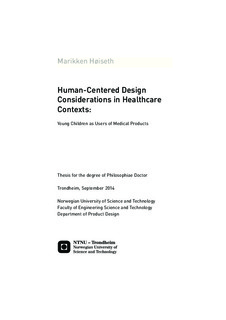| dc.contributor.author | Høiseth, Marikken | |
| dc.date.accessioned | 2015-02-16T14:08:29Z | |
| dc.date.available | 2015-02-16T14:08:29Z | |
| dc.date.issued | 2014 | |
| dc.identifier.isbn | 978-82-326-0400-5 (printed ver.) | |
| dc.identifier.isbn | 978-82-326-0401-2 (electronic ver.) | |
| dc.identifier.issn | 1503-8181 | |
| dc.identifier.uri | http://hdl.handle.net/11250/276404 | |
| dc.description.abstract | Human-centered design represents an overall perspective wherein people are at
the core. However, a general challenge lies in applying human-centered principles to
groups of people and situations that are somehow distant to designers. This thesis
focuses on a user group that has received limited attention in design, namely young
children. Young children represent a group that can be perceived as difficult to reach for
designers. This research has been carried out in order to develop knowledge around
young children as product users in healthcare contexts. The overarching goal of this
thesis is to support the human-centered designer who is concerned with young children
in healthcare contexts and as users of medical products. Another goal is to stimulate
debate and raise awareness about user groups that are commonly overlooked and
perceived as difficult to reach. In order to address these goals, the thesis focuses on the
following three questions that relate to human-centered design principles about gaining
understanding of users and the context of use as well as user-centered evaluation:
• How can the view of people as competent human actors be upheld when
designers address young children?
• How can theories and methods support designers to gain understanding
about experiences of young hospitalized children and their caregivers?
• How can design (as product) foster cooperative interactions between young
children and their caregivers during medical treatment?
These questions have been explored by examining theories and concepts that are
considered relevant for human-centered design, applying methods and eventually
constructing themes and design considerations. The thesis builds on the specific case of
hospitalized young children who receive medical treatment for respiratory diseases. The
work is based on two periods of field study conducted at the children’s ward of a
hospital in Norway, where qualitative methods were used. At an overall level, the
research approach belongs to the interpretivist/constructivist research paradigm, which
resonates with underlying principles of human-centered design. The theoretical
background draws on the disciplines of design, social science, pedagogy, and
philosophy. The questions are addressed through the synopsis, which presents the
research approach and related research, and four included articles.
The contributions of the thesis are a set of considerations that are expected to be
useful for designers involved in practice as well as research, addressing young user
groups, healthcare contexts, and medical product design. Theoretical concepts that can
be used to acknowledge people—young children as well as adults—as competent
human actors are explored and applied. This can support designers to reflect on the
importance of manifesting a human-centered view through methodological consistency.
Moreover, existing approaches to the concept of experience in design have been
addressed, and limitations have been highlighted. The thesis contributes to knowledge
about how an interpretivist/constructivist approach fits human-centered design
principles and the concept of experience. Selected theories and methods have been
applied to gain understanding of experiences related to medical treatment of young
children. The thesis also provides a set of themes and design considerations that,
together with the theoretical concepts, can support designers in the process of improving
and evaluating products used during medical treatment as well as serve as inspiration
for exploring new design spaces aimed at promoting cooperation between children and
caregivers in healthcare contexts. Finally, the thesis contributes to supporting the design
community by presenting suggestions for further research. | nb_NO |
| dc.language.iso | eng | nb_NO |
| dc.publisher | NTNU | nb_NO |
| dc.relation.ispartofseries | Doctoral thesis at NTNU;2014:242 | |
| dc.relation.haspart | Paper 1:
Høiseth, Marikken; Keitsch, Martina.
Using Phenomenological Hermeneutics to Gain Understanding of Stakeholders in Healthcare Contexts. International Journal of Design 2015 ;Volum 9.(3) s. 33-45
Attribution-NonCommercial-NoDerivs 2.5 Generic (CC BY-NC-ND 2.5) | |
| dc.relation.haspart | Paper 2:
Høiseth, Marikken; Keitsch, Martina Maria; Hopperstad, Marit Holm.
Interactions Between Caregivers and Young Children: Exploring Pedagogical Tact in Nebulizer Treatment. Qualitative Health Research 2014 ;Volum 24.(12) s. 1622-1634
<a href="http://dx.doi.org/10.1177/1049732314549017" target="_blank"> http://dx.doi.org/10.1177/1049732314549017</a> | |
| dc.relation.haspart | Paper 3:
Høiseth, Marikken; Giannakos, Michail; Alsos, Ole Andreas; Jaccheri, Maria Letizia; Asheim, Jonas.
Designing healthcare games and applications for toddlers. I: Proceedings of the 12th International Conference on Interaction Design and Children. Association for Computing Machinery (ACM) 2013
<a href="http://dx.doi.org/10.1145/2485760.2485770" target="_blank"> http://dx.doi.org/10.1145/2485760.2485770</a>
Copyright © 2016 ACM | |
| dc.relation.haspart | Paper 4:
Høiseth, Marikken; Hopperstad, Marit H.
“Now We are Going on a Journey”:
Meaning-Making with a Healthcare Game During Toddlers’ Medical Treatment.
Preprint accepted in - Child Care in Practice
<a href="http://dx.doi.org/10.1080/13575279.2015.1054784" target="_blank"> http://dx.doi.org/10.1080/13575279.2015.1054784</a> | |
| dc.title | Human-Centered Design Considerations in Healthcare Contexts: Young Children as Users of Medical Products | nb_NO |
| dc.type | Doctoral thesis | nb_NO |
| dc.subject.nsi | VDP::Technology: 500::Industrial and product design: 640 | nb_NO |
